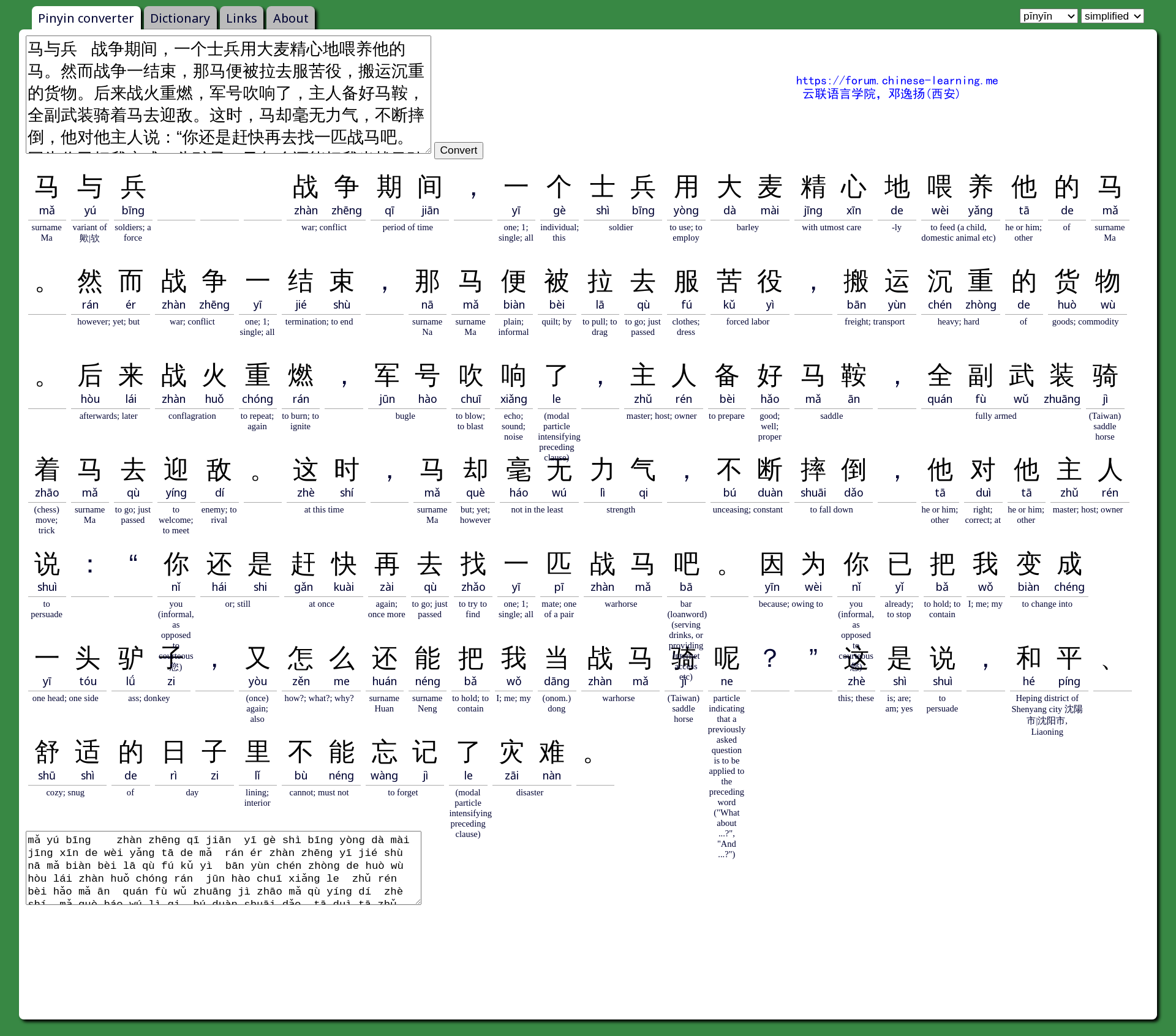
Show Pīnyīn
战争期间,一个士兵用大麦精心地喂养他的马。然而战争一结束,那马便被拉去服苦役,搬运沉重的货物。后来战火重燃,军号吹响了,主人备好马鞍,全副武装骑着马去迎敌。这时,马却毫无力气,不断摔倒,他对他主人说:“你还是赶快再去找一匹战马吧。因为你已把我变成一头驴子,又怎么还能把我当战马骑呢?”
这是说,和平、舒适的日子里不能忘记了灾难。
zhànzhēng qījiān , yīgè shìbīng yòng dàmài jīngxīn dì wèiyǎng tā de mǎ 。 ránér zhànzhēng yī jiéshù , nàmǎ biàn bèi lā qù fú kǔyì , bānyùn chénzhòng de huòwù 。 hòulái zhànhuǒ zhòngrán , jūnhào chuīxiǎng le , zhǔrén bèihǎo mǎān , quánfùwǔzhuāng qízhemǎ qù yíngdí 。 zhèshí , mǎ què háowú lìqì , bùduàn shuāidǎo , tā duì tā zhǔrén shuō : “ nǐ háishi gǎnkuài zài qù zhǎo yīpǐ zhànmǎ bā 。 yīnwèi nǐ yǐ bǎ wǒ biànchéng yītóu lǘzi , yòu zěnme huán néng bǎ wǒ dāng zhànmǎ qí ne ? ”
zhè shì shuō , hépíng shūshì de rìzi lǐ bùnéng wàngjì le zāinàn 。

During the war, a soldier carefully fed his horse with barley. However, as soon as the war was over, the horse was taken to hard labor to carry heavy loads. Then the battle was rekindled, the bugle sounded, and the master prepared the saddle, and rode out fully armed to meet the enemy. At this time, the horse had no strength and kept falling down. He said to his master: "You better hurry up and find another war horse. Because you have turned me into a donkey, how can you ride me like a war horse?" Woolen cloth?"
This means that disasters cannot be forgotten in peaceful and comfortable days.
Durante la guerra, un soldado alimentaba cuidadosamente a su caballo con cebada. Sin embargo, tan pronto como terminó la guerra, el caballo fue llevado a trabajos forzados para transportar cargas pesadas. Más tarde, las llamas de la guerra se reavivaron, sonó la corneta y el maestro preparó la silla de montar y cabalgó para encontrarse con el enemigo con la armadura completa. En ese momento, el caballo no tenía fuerzas y seguía cayendo. Le dijo a su amo: "Será mejor que te des prisa y busques otro caballo de guerra. Porque me has convertido en un burro, ¿cómo puedes montarme como un caballo de guerra? "¿Paño de lana?"
Esto significa que los desastres no se pueden olvidar en días tranquilos y cómodos.
Pendant la guerre, un soldat nourrissait soigneusement son cheval avec de l'orge. Cependant, dès la fin de la guerre, le cheval a été soumis à des travaux forcés pour porter de lourdes charges. Plus tard, les flammes de la guerre ont été ravivées, le clairon a sonné et le maître a préparé la selle et est allé à la rencontre de l'ennemi en armure complète. À ce moment-là, le cheval n'avait plus de force et continuait de tomber. Il dit à son maître : " Tu ferais mieux de te dépêcher et de trouver un autre cheval de guerre. Parce que tu m'as transformé en âne, comment peux-tu me monter comme un cheval de guerre ? « Une étoffe de laine ?
Cela signifie que les catastrophes ne peuvent pas être oubliées dans des jours paisibles et confortables.
戦時中、兵士は馬に大麦を注意深く与えました。しかし、戦争が終わるとすぐに、馬は重い荷物を運ぶために重労働を強いられました。その後、戦争の炎が再燃し、ラッパが鳴り響き、船長は鞍を準備し、完全な鎧で敵に会うために乗りました。この時、馬は力が入らず倒れ続けたので、主人に「急いで別の軍馬を見つけた方がいい。お前は私をロバに変えたのに、どうして軍馬のように乗れるのか?」と言いました。 「毛糸?」
平和で快適な日々の中で災害を忘れることはできないということです。
Während des Krieges fütterte ein Soldat sein Pferd sorgfältig mit Gerste. Sobald der Krieg jedoch vorbei war, wurde das Pferd zur Schwerstarbeit gezwungen, um schwere Lasten zu tragen. Später wurden die Flammen des Krieges wieder entfacht, das Horn ertönte und der Meister bereitete den Sattel vor und ritt dem Feind in voller Rüstung entgegen. Zu diesem Zeitpunkt hatte das Pferd keine Kraft mehr und fiel immer wieder hin. Er sagte zu seinem Herrn: „Du beeilst dich besser und suchst dir ein anderes Streitross. Weil du mich in einen Esel verwandelt hast, wie kannst du mich wie ein Streitross reiten? "Wollstoff?"
Dies bedeutet, dass Katastrophen in ruhigen und komfortablen Tagen nicht vergessen werden können.